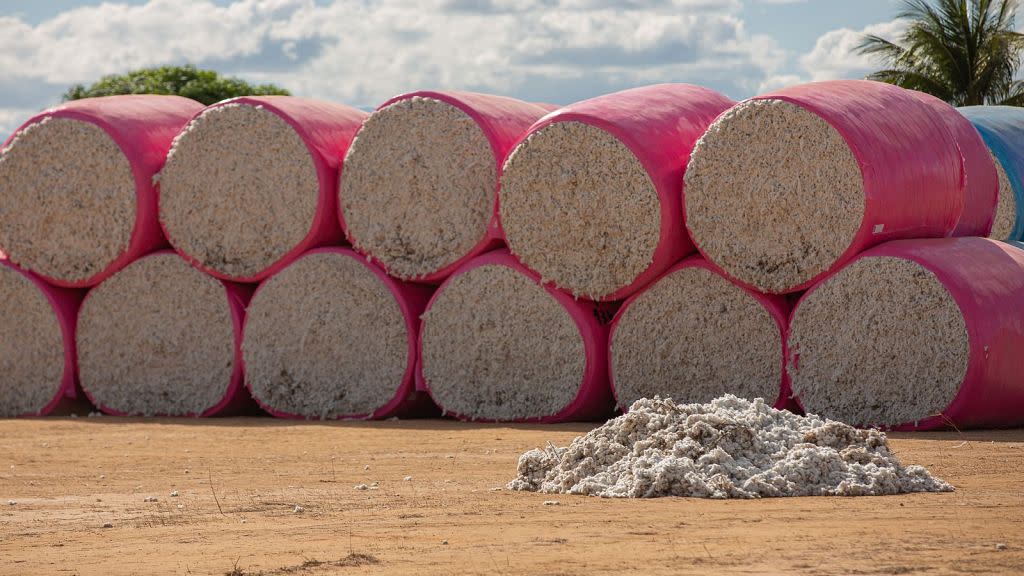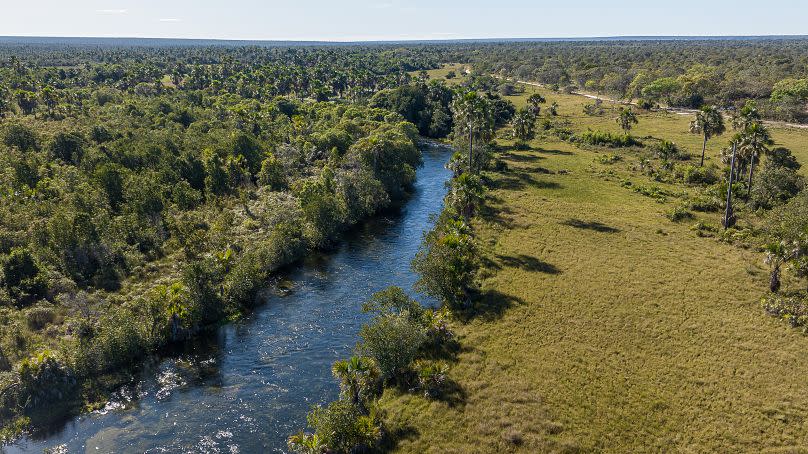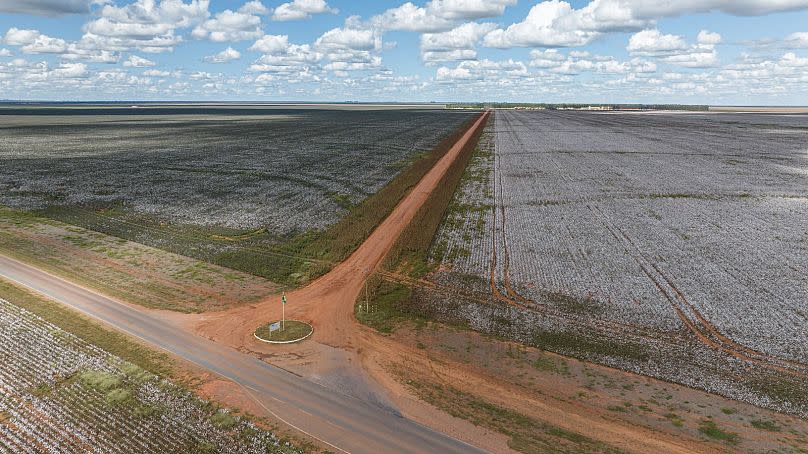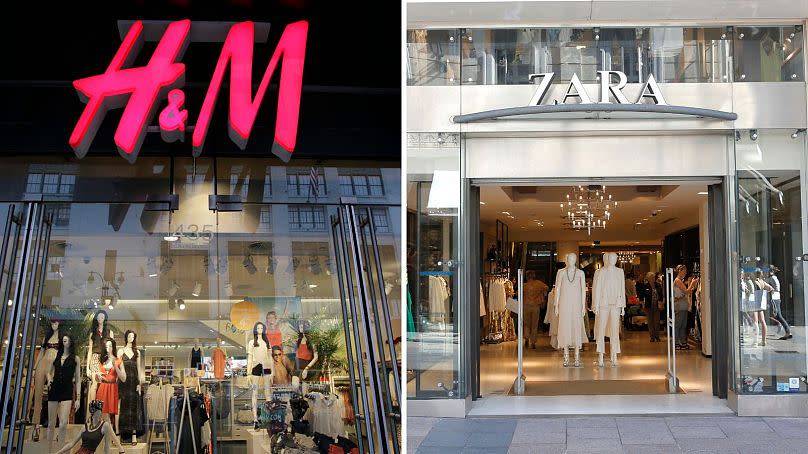Zara, H&M: The European retail giants tied to land grabbing and deforestation in Brazil

Cotton clothes, towels and bed sheets from H&M and Zara are “stained” by illegal deforestation and human rights abuses, according to a new investigation.
UK-based investigative NGO Earthsight has traced 800,000 tonnes of cotton from the giant Western retailers to Brazilian estates where land grabbing, violence and corruption are rife.
This cotton is exported to several manufacturers in Asia, which together made nearly 250 million items of clothing and homeware in a year for global stores of H&M, Zara and its sister brands.
“These firms talk about good practice, social responsibility and certification schemes, they claim to invest in traceability and sustainability, but all this now looks about as fake as their highstreet window arrangements,” says Earthsight director Sam Lawson.
All the cotton traced by the NGO was certified as sustainable by Better Cotton - the world’s biggest cotton certification scheme.
Where is Brazil’s cotton coming from?
The world is well aware of the critical importance of the Amazon, with frequent updates on the scale of forest loss driven by cattle ranches and soybean plantations.
But while the latest news from the ‘lungs of the Earth’ is tentatively positive, just south of the forest is another precious ecosystem being ravaged at an alarming rate.
The Cerrado region is characterised by dramatic plateaus and lush valleys. It is, remarkably, home to five per cent of the world’s species - including giant anteaters, giant armadillo and jaguars.
More than half of this tropical savannah - which spans a quarter of Brazil - has been cleared for large-scale agriculture in recent decades. Last year, deforestation here soared by 43 per cent.

This “plundering” of the Cerrado coincides with a boom in Brazilian cotton production for export, says Earthsight. The country is on track to overtake the US as the world’s biggest cotton exporter by 2030.
Ecologists warn that this lush biome is being sacrificed to save the more famous Amazon, to which it is nonetheless intrinsically linked.
“Internationally, the Cerrado is not very well known. If it had a name like the Amazon, we would have more [public] policies that benefit the conservation of the biome,” Ane Alencar, science director at Brazilian nonprofit IPAM said earlier this year.
How are green corridors saving one of Brazil’s most endangered species from deforestation?
Amid rampant deforestation, the EU must safeguard its ‘green jewel’
How is land cleared for cotton plantations in the Cerrado?
The western Bahia state of the Cerrado is particularly scarred by industrial-scale farming. Agribusinesses here extract nearly two billion litres of water a day, sucking riverbeds and streams dry, as locals showed Earthsight investigators.
By trawling through thousands of shipment records, the NGO discovered that H&M and Zara’s suppliers source cotton grown in this state by two of Brazil’s biggest producers.
These companies - SLC Agrícola and Grupo Horita - are owned by two of Brazil’s richest families. And according to Earthsight, they have a long record of court injunctions, corruption rulings and millions of dollars in fines from clearing 1,000 square kilometres of Cerrado wilderness.

On the Estrondo mega-state - where Horita is the main landholder - violent land disputes against traditional communities date back decades. In 2018, Bahia’s attorney general found Estrondo was one of the largest areas of land grabbed in Brazilian history. A year later, two community members were shot by Estrondo’s security guards, after an escalation in intimidation and harassment.
Earthsight says these companies’ operations are “emblematic of a broader reality of export-oriented agribusinesses inflicting harm on the Cerrado, its traditional communities and the climate.”
It is rare for large-scale farms not to grab land, local campaigners in one region told Earthsight.
Clearing Cerrado vegetation for agriculture generates as much carbon per year as the annual emissions of 50 million cars, the Brazilian government estimates.
And cotton, which is often produced in rotation with soy on these mega estates, is especially damaging due to the heavy use of pesticides.
The EU and UK exported 1,000 tonnes of a banned pesticide to poorer countries, investigation reveals
How is this ‘tainted’ cotton threaded into Zara and H&M clothes?

Shipment records seen by Earthsight show the Horita Group and SLC Agrícola directly exported at least 816,000 tonnes of cotton from Bahia to foreign markets between 2014 and 2023.
Eight Asian clothing manufacturers took this raw cotton while supplying H&M and Inditex (Zara’s owner). PT Kahatex in Indonesia was the biggest buyer of this “tainted” cotton, before sending millions of cotton socks, shorts and trousers to H&M.
All Inditex imports to Europe arrive in Spain and the Netherlands, before being distributed to stores across Europe as the season’s ‘must-have’ items.
As part of an effort to clean up their act, the fast fashion giants have signed up to an ethical supply chain certification system called Better Cotton (BC). Most of the firms’ products are made with BC-certified cotton, making them the world’s biggest users of cotton carrying the BC seal of approval.
The problem is that all the cotton Earthsight linked to environmental degradation and human rights abuses in Bahia carried the BC label.
Yesterday, it was reported that Inditex has demanded more transparency from Geneva-based Better Cotton in response to the investigation. BC said earlier this month that it has concluded a third party audit of three farms implicated by Earthsight, and is planning to publish its findings on 26 April.
It added that its strategic partner in Brazil, the Brazilian Association of Cotton Producers, was revising elements of its standards to align with those of Better Cotton.
How can we stop the trade in dirty cotton?
Since the EU is one of the largest importers of clothing in the world (second to the US), Earthsight argues the bloc has a big responsibility to clean up its supply chains.
“It has become very clear that crimes related to the commodities we consume have to be addressed through regulation, not consumer choices,” says Lawson.
“That means lawmakers in consumer countries should put in place strong laws with tough enforcement. In the meantime, shoppers should think twice before buying their next piece of cotton clothing.”
While there are a number of incoming laws to regulate supply chains, the NGO points out ongoing loopholes. The EU’s Corporate Sustainability Due Diligence Directive (CSDDD) - set to be finalised in the next couple of months - will only cover the largest firms.
While a new EU Deforestation Regulation forces firms to trace some raw materials back to production that must be deforestation-free and legal, but neglects cotton.
What do Zara and H&M say?
“We welcome Earthsight’s commitment on these issues and take these allegations extremely seriously,” H&M said in response to the finding. “We are in close contact with the Better Cotton certification owner - who has begun a thorough investigation into the specific allegations.”
H&M - with sister brands including COS, Monki, & Other Stories, Arket and Weekday - says it reached its goal to source 100 per cent of cotton from recycled, organic or more sustainable sourced (e.g. BC cotton) back in 2020.
Inditex - which owns Berksha, Pull&Bear and Massimo Dutti as well as Zara - told Earthsight, “We take very seriously any information regarding improper practices in the textile industry.
“After receiving your letter, we have shared its contents with Better Cotton, who confirmed to us that they have launched an investigation, in collaboration with their on-the-ground partner, ABRAPA.”

